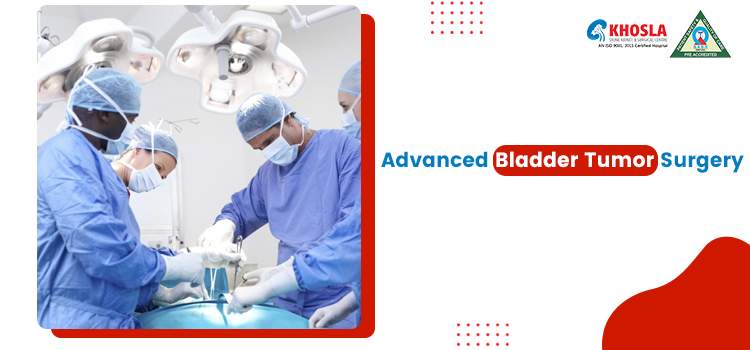![]()
Bladder Tumor
The bladder holds urine in the body until you have the urge to leave it. Around 90% of bladder cancer cells occur in the innermost bladder wall lining. Bladder cancer is treated through intravesical chemotherapy, surgery, chemotherapy, radiation therapy, and immunotherapy. Usually, cancer affects the deep bladder layer or fatty tissues surrounding the bladder. If you suspect anything wrong with your urological health, then make sure to visit one of the Best Urology hospital in Punjab to well-manage the situation.
Stages of bladder tumor
In many cases, the patient knows they have a bladder tumor or cancer when it’s in the early stage (present near the bladder lining) or invasive (spreads to the nearby organs or lymph nodes). The bladder tumor has four stages which include:
- Stage 1
The bladder tumor is near the bladder lining or connective tissue just below the lining and does not reach the bladder muscle wall.
- Stage 2
The cancer spreads to the bladder muscle wall.
- Stage 3
Cancer spreads to the fatty tissues present outside the muscle bladder.
- Stage 4
Cancer has spread beyond the bladder affecting the lymph nodes, bones, and other organs.
The doctor will check the tumor stage and accordingly tell you if there’s a need for the Bladder tumor surgery In Ludhiana to address the present situation. Your entire treatment will be personalized after carefully checking how problematic the current situation is.
Symptoms and signs of bladder cancer
Be mindful of the signs and symptoms you notice daily. If you keep on ignoring the condition, then your situation is likely to get worse with time. Some of the significant symptoms of bladder cancer that tell you to need to schedule an immediate consultation with the urologist in Ludhiana to analyze what’s wrong with your condition. Some of the warning signs and symptoms are:
- Pain during urination
- Blood in the urine
- Frequent urination
- Problem starting a urine stream
Diagnosis and test for bladder
If the urologist suspects you have a bladder tumor, necessary tests and diagnoses are performed to rule out what is wrong with your well-being. Some of the required diagnostic tests are:
- Urinalysis: Look for signs of infection and other symptoms. The microscopic examination of urine to look at cancer cells.
- Cystoscopy: Diagnose and identify bladder cancer through the telescope by checking the inner area of the bladder and inside of the bladder.
- TURBT (Transurethral Resection): TURBT is used as a diagnostic and therapeutic treatment. The procedure uses general or spinal anesthesia for bladder tumors.
The doctor performs CT scan, MRI, chest X-ray, bone scan, and other tests to correct the issue and understand what approach should be taken. The condition’s stage and severity help determine the right course of action.
Treatment and management of bladder tumor
The treatment for bladder tumors includes four major types:
- Surgery
- Chemotherapy
- Intravesical chemotherapy or immunotherapy for superficial cancers
- Radiation therapy
Sometimes, the doctor will suggest combinational treatment to improve your overall well-being. With your urologist, you can discuss what sort of treatment plan will make you feel better and what necessary steps you need to take.

